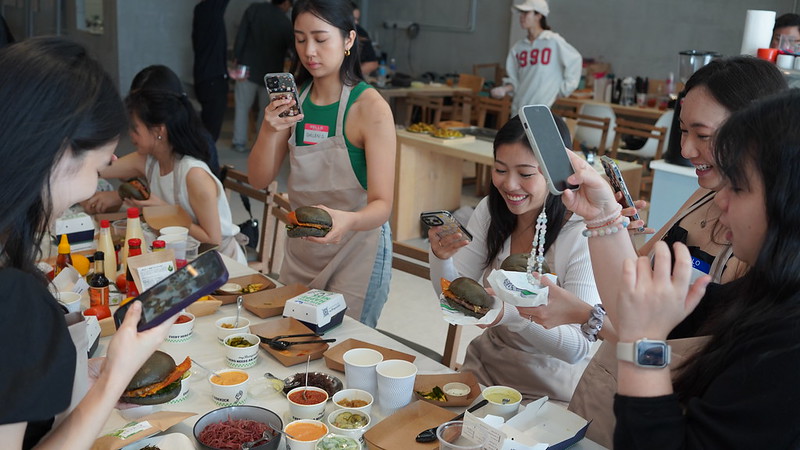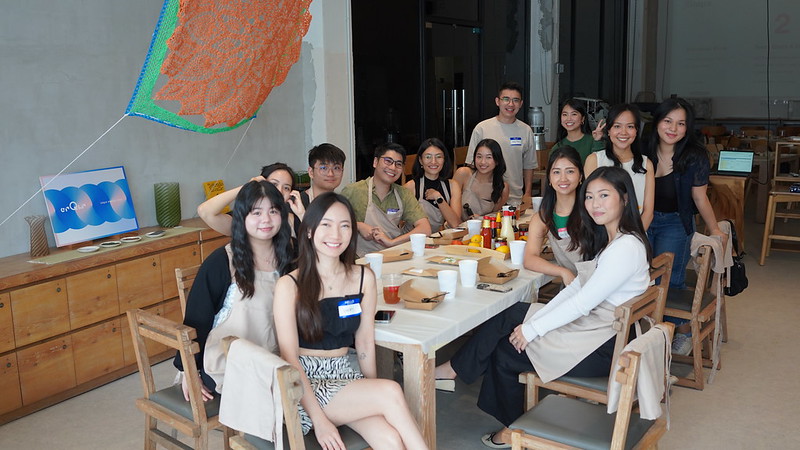Event report
May 20, 2025
FabCafe Global Editorial Team
Malaysia is a multi-ethnic country and an active member in Southeast Asia’s fast-growing economy. In light of the country’s economic potential, Japanese companies are quickly expanding into Malaysia, especially in the areas of food and beverage and lifestyle. A key consideration is how to connect with the diverse local food culture and sensibilities.
FabCafe Kuala Lumpur (hereafter, FabCafe KL) opened in 2016 in Kuala Lumpur, the capital of Malaysia, and relocated to a larger space in October 2024. To celebrate the renewal, FabCafe Global held a co-creation workshop with SEA VEGETABLE COMPANY, a Japanese startup that is a champion and innovator in Japan’s rich legacy of seaweed-based food culture. The company aims to develop technologies from seaweed research to production as well as propose new ways of eating seaweed.
The October 2024 workshop, Seaweed Salon, was designed as a process to think about “eating sustainably” with local chefs and consumers. It also served as an experiment to explore how stakeholders can utilize the FabCafe network’s overseas locations. Currently, FabCafe is spread across 13 locations around the world, each with its own unique local partners, culture, and challenges. Seaweed Salon and similar programs further expand the value of the FabCafe network and its potential to foster questions and new ideas alongside the local creative community.
About FabCafe KL

The vibrant, creative neighborhood around FabCafe KL is a college town, home to five universities, as well as scores of makers, designers, and entrepreneurs. FabCafe KL is designed as a center for the creators and innovators of the local community. The space is dynamic and experimental, blending cutting-edge technology, artistic inspiration, and a retail zone showcasing local artists.
Malaysia is an economic and cultural powerhouse in the making within the region, thanks to its strong infrastructure, multilingual talent pool, and rising middle class. As Japan deepens ties in various areas with Southeast Asian countries through strategic partnerships, Malaysia stands out as an ideal platform for testing new ideas, products, and international collaborations.
By partnering with myBurgerLab, a beloved and innovative Malaysian restaurant chain, and inviting young influencers to experiment with Japanese seaweed, Seaweed Salon inspired more than just a flavor fusion. This collaboration represents a live demonstration of cross-cultural product development and design.

The roots of Seaweed Salon go back to the crQlr Awards 2023, an award for circular design organised by Loftwork and FabCafe, where SEA VEGETABLE COMPANY was selected as a special prize winner. Through this award, they forged a strong relationship with FabCafe. When FabCafe KL made plans to relocate, the FabCafe Global team approached SEA VEGETABLE COMPANY about a collaboration.
Rather than an exhibition, the planning team wanted to prioritize co-creation; ultimately, they designed a workshop to craft local recipes using seaweed. It was crucial to the team to involve myBurgerLab, a popular local food and beverage brand, and the local influencer community. This was made possible by the network and trust that FabCafe KL has cultivated over the years.

The day began with a lecture from SEA VEGETABLE COMPANY on the environmental background and characteristics of seaweed as an ingredient. After that, myBurgerLab gave a short presentation on umami and its relationship with MSG. This was followed by a tasting of seven traditional Japanese seaweeds, where participants experienced the flavors and textures of each.
After the tasting, the participants were divided into groups to come up with unique recipe ideas. Each group presented their final recipes to the room, and the participants voted on their favorite. The workshop concluded with a tasting of the demo recipes by SEA VEGETABLE COMPANY and myBurgerLab, tying the event together as an experience of the intersection of ingredients and culture. FabCafe KL became a place where taste, texture, aroma, and conversation gave rise to a new awareness of the unique properties and combinations of seaweed.
Through this process of co-creation, we have come to realize the potential of thoughtful eating with local consumers and creators. Seaweed Salon could go beyond conveying the appeal of ingredients and become a place that fosters empathy and creates context.
Seaweed Salon was not primarily focused on introducing products or brands. Rather, the organizers thought it would be more meaningful to find the seeds of insight. How would the products be received locally? Would any cultural discomfort arise through dialogue with consumers and chefs?
Connecting with local food creators and influencers is certainly a potential sales channel and distribution opportunity. But more importantly, new perspectives and questions can be generated by examining the values, trends, cooking, and tastes of local people.
At Seaweed Salon, while making, eating, and talking, participants found new intersections of the experiences and sensibilities they brought to the table. At these intersections were born unexpected discoveries and meanings. This collaborative process is a core approach in expanding FabCafe overseas.
Minami Tsukamoto, chef at SEA VEGETABLE COMPANY, who participated in this initiative

She realized that seaweed is not just an “ingredient” but is also perceived by local people in the context of sustainability and environmental awareness.
“In Malaysia, wakame seaweed and nori are the most commonly eaten types of seaweed. Agar-agar, a powder used to make jelly, is another common form of seaweed here. Aonori (green laver) was especially popular in the workshop and recipes, but there was also a lot of interest in other seaweeds. Of course, there was the perspective that it tastes good, but there was also a strong interest in the marine environment. People were interested in contributing to the ocean by eating good food!”
FabCafe is not strictly an event space nor a cafe, but a platform for co-creation. Its insights may not immediately turn into revenue. However, events like Seaweed Salon plant the seeds of relationships between the local culture and people, which could eventually blossom into the foundation for opening a market.
In this article, we explored a recent event at FabCafe KL. In facilitating Seaweed Salon, what we realized once again was the true power of the FabCafe network.
Currently, FabCafe has 13 locations around the world, each with local partners, cultures, and challenges rooted in their respective locations. What they have in common is that they build their communities around thinking and creating something together — not just selling coffee.
If you are thinking about developing services or products in a new location, drop by your nearest FabCafe! Part event venue, part exhibition space, each cafe functions as a foothold for co-creation with their local community — meet with users, get close with the community and culture, and collaborate with creatives. Through this process, you will discover a holistic approach that is not just about overseas expansion, but one that is more deeply rooted in the local community.
We intend to further expand the potential of the FabCafe network for fostering questions through repeated community practice in a variety of regions and topics.

- Author: Keita Nagashima (Loftwork),
- Planner/editor:Mai Miyazaki(Loftwork)
- Editor: Gina Goosby (FabCafe Global)
- Organizers: FabCafe KL, FabCafe Global, crQlr Awards
- Collaborators: Minami Tsukamoto (Sea Vegetable Chef), Chin Ren Yi (myBurgerLab Co-founder), Creators’ Club
-
FabCafe Global Editorial Team
This articles is edited by FabCafe Global.
Please feel free to share your thoughts and opinions on this article with us.
→ Contact usThis articles is edited by FabCafe Global.
Please feel free to share your thoughts and opinions on this article with us.
→ Contact us






